African Fruits: Fascinating Facts and Nutritional Benefits
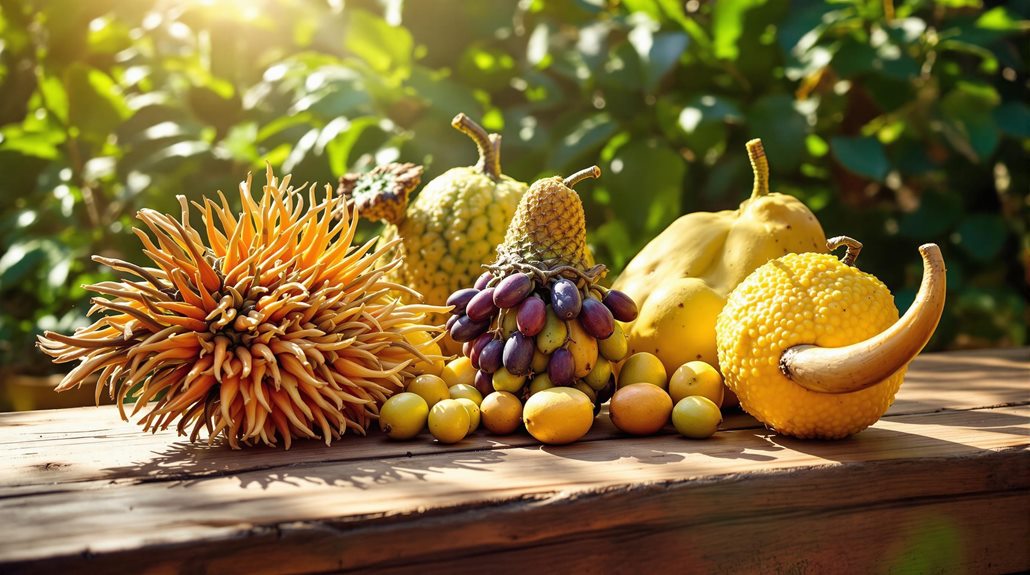
You'll find African fruits are not only culturally significant but also packed with nutritional goodness. Baobab offers three times the vitamin C of oranges, aiding your immunity and bone health. If you're watching your weight, African Mango could be your best ally with its high fiber content that helps manage cholesterol. For a potassium and calcium enhancement, African Star Apple is exceptional, delivering 700mg of potassium and 400mg of calcium per 100g. These fruits offer more than just health benefits—they represent rich traditions and promising economic growth. There's so much more to uncover about these fascinating fruits and their uses.
Cultural Importance of African Fruits
African fruits are more than just food; they're a lively part of local traditions and celebrations. You'll find these indigenous fruits deeply woven into cultural practices, symbolizing abundance and health. At local festivals, African fruits play a central role, not just for their taste but also for their representation of community identity and shared heritage. These fruits, like Baobab and African Mango, aren't just valued for their nutritional benefits; they're integral to traditional medicine, illustrating their importance in health practices passed down through generations.
When you investigate the cultural significance of African fruits, you uncover their role in traditional medicine and rituals. They're often used as offerings or sacred ingredients in ceremonies, reflecting deep-rooted beliefs and practices. This cultural relevance supports local economies, providing opportunities for small-scale farmers to increase production and examine export potential. By consuming and cultivating these indigenous fruits, communities not only preserve their traditions but also promote economic growth.
In essence, African fruits offer more than sustenance. They're a bridge to the past, a reflection of cultural resilience, and an essential part of health and community identity, enriching lives far beyond their nutritional value.
Nutritional Benefits of African Fruits
Imagine biting into a juicy, colorful tropical fruit that's not only delicious but packed with nutrients to improve your health. African fruits offer a powerhouse of benefits, with many boasting higher vitamin C levels than guava or oranges, which are vital for immune support. The Baobab Fruit, for instance, delivers three times the vitamin C of oranges and is rich in calcium, improving bone health and overall nutrition.
Don't overlook the African Mango, which is high in fiber. Its high fiber content plays a significant role in removing cholesterol and aiding in weight management. In fact, studies show that using its seed capsules can lead to an average weight loss of 5.26%. Meanwhile, the African Star Apple presents a strong nutritional profile, with significant amounts of potassium (700mg) and calcium (400mg) per 100g. These nutrients are fundamental for supporting heart and bone health.
Moreover, numerous African fruits are teeming with antioxidants. These antioxidants may help lower cholesterol levels and reduce the risk of chronic diseases, making them an incredible supplement to your diet. Welcome these lively fruits to enrich your nutritional intake and strengthen your health.
Health Impacts of Baobab
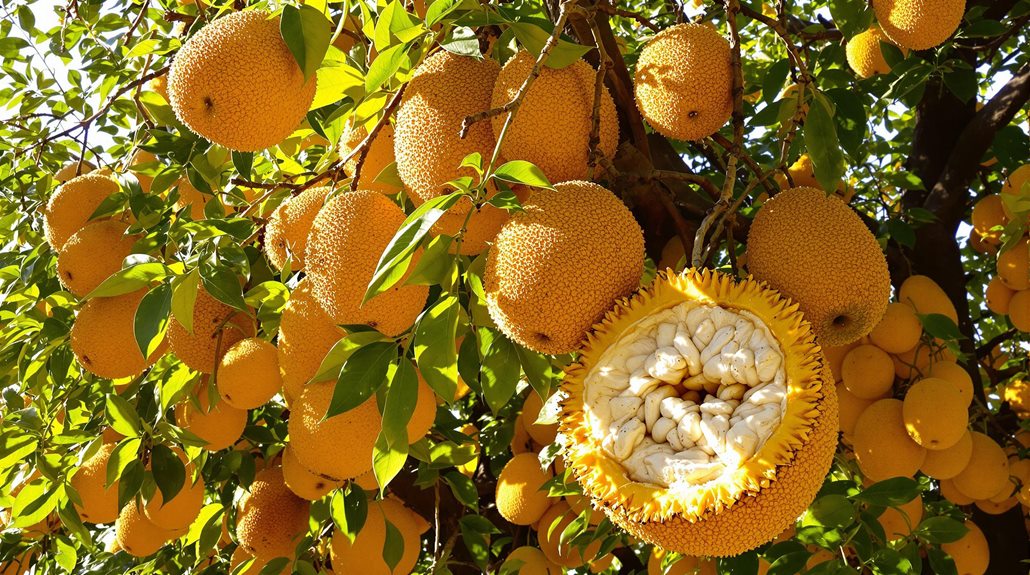
The baobab fruit stands out as a nutritional powerhouse with significant health benefits. Packed with vitamin C, it offers up to three times more than oranges, strengthening your immune system and improving skin health. But that's just the beginning. Its high fiber content, with just one tablespoon providing up to 18% of your daily needs, supports digestive health by promoting regular bowel movements.
Baobab is also rich in antioxidants and polyphenols, which reduce oxidative stress and inflammation. This powerful combination may lower your risk of chronic diseases like heart disease and diabetes. In relation to blood sugar, baobab plays a vital role. It helps regulate glucose by slowing down its absorption, preventing spikes, and improving insulin sensitivity. This can be particularly beneficial for maintaining stable blood sugar levels.
In terms of metabolic health, regular consumption of baobab can improve feelings of fullness, curb cravings, and support weight management efforts. Its ability to promote satiety makes it a useful ally in your path towards healthier eating habits. Welcome the baobab fruit, and you'll find a natural way to elevate your overall well-being.
African Mango for Weight Loss
Revered for its weight loss potential, African mango extract (AME) has caught the attention of health enthusiasts worldwide. Studies show impressive results, with participants losing an average of 28 pounds over 10 weeks by taking AME daily. It's no surprise that African mango extract is gaining popularity as a natural aid for weight loss. The extract greatly reduces body fat and waist circumference, while also improving cholesterol levels.
The secret lies in the high fiber content of African mango, which helps regulate your appetite and promotes a feeling of fullness. This means you'll consume fewer calories without feeling deprived. To optimize the nutritional benefits, recommended dosages range from 150 mg twice daily to 1.05 grams thrice daily, ideally taken with meals for maximum absorption.
Beyond weight loss, AME offers other health benefits. Preliminary research suggests it may improve insulin sensitivity and help control blood sugar levels. This not only supports weight management efforts but also contributes to improved metabolic health. By incorporating African mango extract into your routine, you're not just shedding pounds; you're actively working towards a healthier lifestyle.
African Star Apple's Nutrients
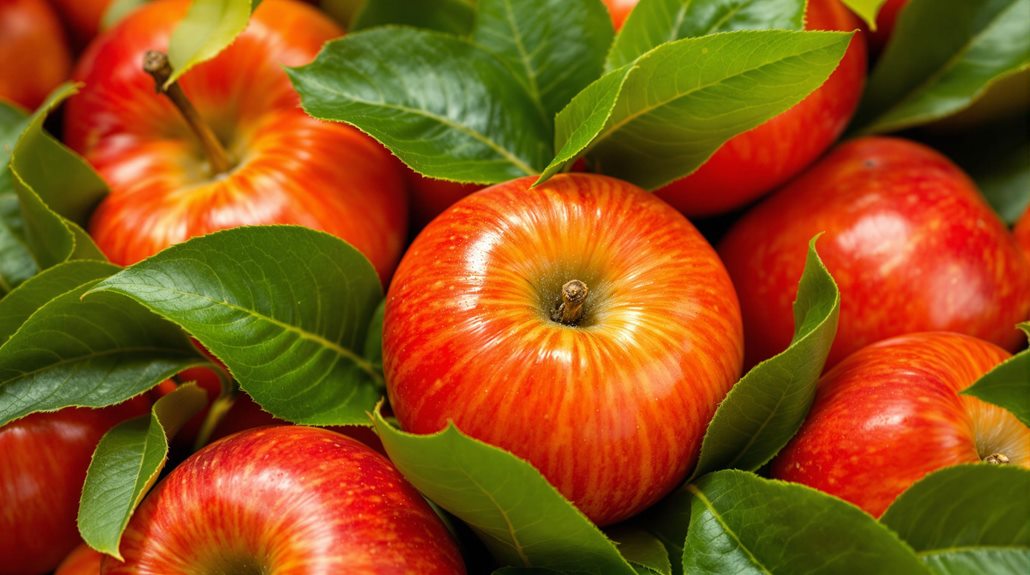
Situated within the lively landscapes of Africa, the African Star Apple offers a powerhouse of nutrients that can improve your health. With a nutritional content that includes approximately 120 calories per 100g serving, this fruit stands out in its ability to support your well-being. Packed with 4g of protein, 5.5g of fat, and 9g of carbohydrates, it provides a balanced array of macronutrients. Its high vitamin C content at 93mg per serving strengthens immune health and helps combat oxidative stress.
| Nutrient | Amount per 100g |
|---|---|
| Potassium | 700mg |
| Calcium | 400mg |
| Phosphorus | 215mg |
The African star apple is rich in potassium, calcium, and phosphorus, contributing greatly to bone health. Your bones benefit from these minerals, ensuring strength and density. Additionally, the 4.5g of dietary fiber aids in digestion, helping you manage blood sugar levels and supporting gut health. With 340µg of beta-carotene, the fruit improves eye health and may enhance vision. Incorporating the African star apple into your diet can be a delicious way to increase your nutrient intake, promoting general health and vitality.
Culinary Uses of African Fruits
Exploring the culinary uses of African fruits reveals a world of flavors and versatility. You'll find that these fruits like Baobab and African Star Apple offer unique opportunities in the kitchen. Baobab, with its tangy and nutrient-rich pulp, can be enjoyed fresh or blended into smoothies, contributing both flavor and nutritional value to your morning drink. Its versatility extends to desserts, where it improves taste while increasing health benefits.
African Star Apple's pulp can be transformed into delightful jams, jellies, and syrups. These sweet creations not only preserve the fruit's health benefits but also introduce a sweet and tangy flavor to your meals. Meanwhile, the African Mango is a staple in traditional soups and sauces, proving that its culinary uses go beyond just being a dietary supplement.
Salads also benefit from the inclusion of African fruits. Incorporating Baobab or African Star Apple provides texture and a nutrient increase, making your salad more exciting and nutritious. Furthermore, the seeds of these fruits are often pressed for oil, offering extra culinary possibilities. Regardless of you're making smoothies, jams, soups, or salads, African fruits bring an exciting and healthy twist to your dishes.
Medicinal Properties of Kola Nut
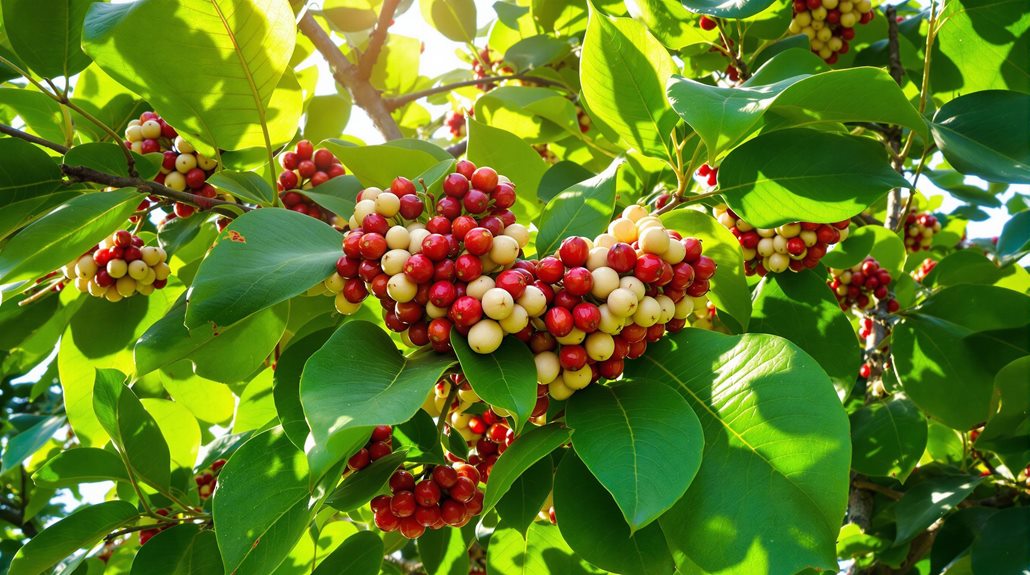
After uncovering the culinary wonders of African fruits, let's turn our attention to the kola nut, known for its remarkable medicinal properties. Rich in caffeine, the kola nut serves as a natural stimulant, often used to combat fatigue and migraines. Its stimulant properties can improve alertness and elevate mood, a reason it's traditionally chewed in social and ceremonial gatherings.
The kola nut's bioactive compounds, such as flavonoids and tannins, provide antioxidant properties that contribute to its health benefits. These compounds support general health, making the kola nut a valuable component in some cultures.
| Aspect | Details |
|---|---|
| Stimulant Properties | High caffeine content combats fatigue, boosts alertness |
| Antioxidant Properties | Flavonoids and tannins support health |
| Traditional Use | Chewed to improve mood, used in ceremonies and gatherings |
While the kola nut offers several health benefits, it's crucial to be cautious of its side effects. Its stimulant properties may cause insomnia and increased heart rate if consumed excessively. Additionally, its caffeine content makes it a sought-after flavoring ingredient in the global soft drink industry. As you investigate the kola nut, enjoy its benefits but remain mindful of potential side effects.
Research Potential of African Plants
Recognizing the vast potential of African plants for research and development, there's a considerable opportunity to discover new drugs and health supplements. The continent boasts a rich diversity of medicinal plants that haven't been fully investigated compared to their global counterparts. This untapped potential presents a unique opportunity to improve the modern healthcare and nutrition markets. For instance, the African Baobab fruit is gaining popularity, with approvals from the EU and FDA, showcasing its nutritional benefits and potential as a health supplement.
Colonial history and cultural beliefs have historically hindered research into African medicinal plants. However, the growing global interest in natural health products offers a chance to revitalize this area. Integrating traditional knowledge with scientific research can considerably boost the market value of these plants and fruits. This approach not only benefits local economies but also improves access to affordable healthcare solutions.
Ongoing studies are vital, especially considering the potential toxicity of certain plants like the African Oil Bean. Proper understanding and processing are important to guarantee safety and optimize benefits. By embracing this research opportunity, you can help reveal the numerous health benefits hidden within Africa's botanical diversity.
Sustainability in Fruit Cultivation
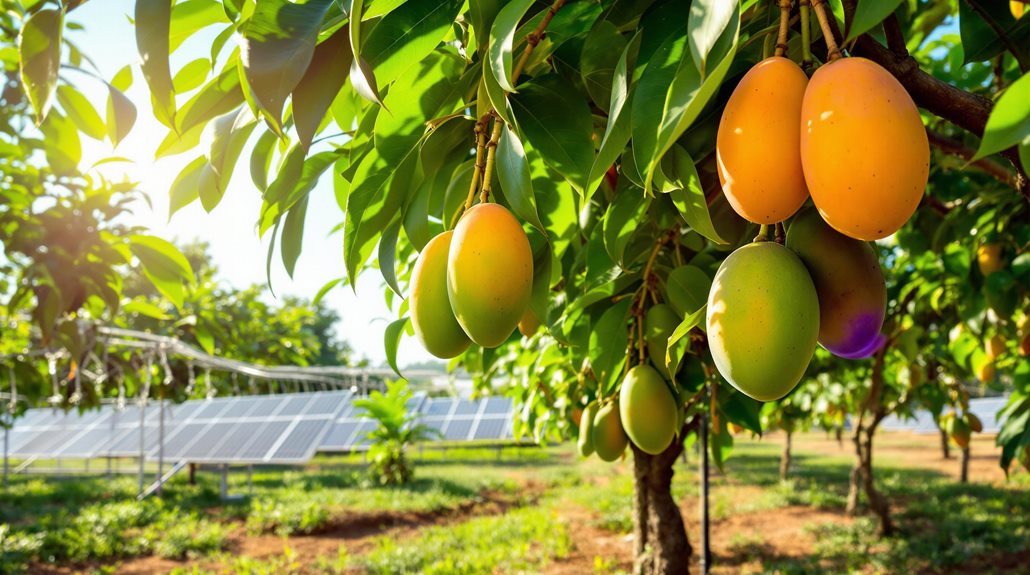
While tapping into the research potential of African plants promises to revolutionize healthcare, the sustainability of fruit cultivation is just as crucial. Sustainable harvesting methods and agroforestry practices are essential in maintaining biodiversity and improving soil health. By integrating trees like the African star apple, which requires minimal maintenance, you support small-scale farmers and promote sustainable agricultural practices.
Agroforestry isn't just about planting trees; it's about creating an ecosystem that nurtures both the environment and local economies. Baobab trees exemplify this balance, living for over a thousand years and providing nutrient-rich fruit with minimal resource input, thereby contributing to food security.
| Practice | Benefit | Impact on Local Economies |
|---|---|---|
| Agroforestry | Improves biodiversity | Supports small-scale farmers |
| Sustainable Harvesting | Preserves ecosystems | Guarantees steady resource supply |
| Traditional Knowledge | Increases production capacity | Raises market value |
Incorporating traditional knowledge into modern cultivation techniques can greatly increase production capacity and market value for indigenous fruits. This approach not only benefits local economies but also supports ecosystems. By embracing these practices, you're contributing to a sustainable future where nutrient-rich fruits are plentiful, ecosystems thrive, and food security is strengthened.
Traditional Remedies and Practices
Many traditional remedies and practices in Africa showcase the deep connection between communities and their natural environment. Traditional African medicine, which remains an integral part of daily life for up to 80% of the population, leans heavily on medicinal plants and indigenous fruits. This deep-rooted system, built on local knowledge, highlights the significant role of natural resources in health and wellness. For example, the bark of certain trees is used to treat illnesses like yellow fever and malaria, while leaves provide relief for wounds, stomachaches, and diarrhea.
Indigenous fruits, such as Baobab and African Mango, are not only essential for their nutritional benefits but also for their health benefits in traditional remedies. These fruits help address ailments like fever and digestive issues, demonstrating nature's remarkable pharmacy. Embracing sustainable practices guarantees that these valuable resources endure for future generations.
Raising awareness and conducting research can enhance the market value of these fruits, encouraging their integration into modern healthcare systems. By doing so, the nutritional and health benefits of these indigenous resources can be more widely appreciated and utilized. Preserving indigenous knowledge and sustainable practices is indispensable as modern medical advancements continue to evolve.




